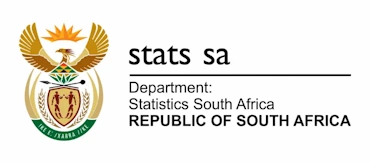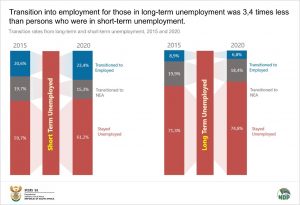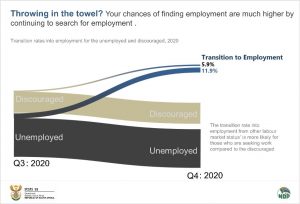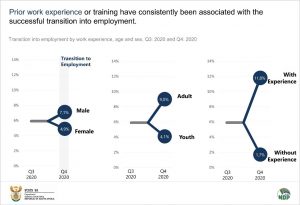Don’t throw in the towel!
Your chances of finding a job are much higher if you continue your search for employment.
Estimates from the Quarterly Labour Force Survey, released by Statistics South Africa, show that the likelihood of finding employment is much higher if you continue to search for work or are available to take up a job or start a business, if circumstances allow.
In 2020, 61,2% of persons who were unemployed for less than a year (i.e. in short-term unemployment) remained unemployed. This was a 1,5 percentage points increase compared to 2015 (59,7%). Furthermore, those in short-term unemployment were more likely to find employment than those in long-term unemployment (i.e. unemployed for a year or longer). In 2020, the transition into employment for those in long-term unemployment was 3,4 times less than persons who were in short-term unemployment.
Is the decrease in likelihood of finding a job due to factors such as a loss of skill as a result of being jobless or out of work? Are employers biased towards those that have been unemployed for longer periods? Are there other socio-demographic factors that make it more difficult for job seekers to obtain work?
Labour market transitions, that is, the mobility of workers between jobs and in and out of employment, play an important role in policy discussions surrounding the future of work. The Centenary Declaration for the Future of Work, adopted in June 2019 at the International Labour Conference (ILC), calls for “effective measures to support people through the transitions they will face throughout their working lives” as well as “promoting the transition from the informal to the formal sector economy while giving due attention to rural areas”1.
Being discouraged due to the unavailability of jobs in the area, or the inability to find work requiring the skills held by individuals, or the hopelessness of finding work, might play a role in not obtaining work after an extensive period of unemployment. About 5,9% of those who were discouraged in Q3:2020 found employment in the following quarter compared to 11,9% of those who were looking and available to work.
Transition rates into employment for the unemployed and the discouraged, 2020
Unemployed females are less likely to move into employment than males, with only 4,9% having moved into employment in Q4:2020 compared to Q3:2020. About 7,1% of their male counterparts found a job after being unemployed in the previous quarter.
In South Africa, unemployment is disproportionally higher among young people relative to the average working population. In addition, prior work experience and higher levels of education or training have consistently been associated with the successful transition into employment, as they improve the chances of finding a job. While improving educational outcomes remains crucial to reducing unemployment, having work experience also improves the chances of securing employment.
Persons with prior work experience are more likely to transit into employment when compared to those without work experience. About 11,8% of those with prior work experience transitioned into employment, compared to only 1,7% of those with no work experience in 2020.
Similar to experience, education plays an important role in the transition from unemployment to employment. Unemployed individuals without a matric qualification are less likely to move from unemployment to employment. In Q3:2020, approximately 4,9% of unemployed individuals without matric moved into employment in Q4:2020. In comparison, higher levels of education seem to improve one’s chances of securing a job. Individuals with a tertiary education (10,1%) are more likely to move from unemployment to employment compared to other education levels.
The transition rate from unemployment to employment was highest in Limpopo (20,3%) followed by the Western Cape (17,4%), while KwaZulu-Natal (7,0%), Eastern Cape (7,7%) and North West (7,8%) recorded the lowest transitions into employment in 2020.
The informal sector serves as a stepping-stone into the formal sector. In South Africa, 71,3% of people who worked in the informal sector in Q3: 2020 retained their jobs in Q4: 2020, while 12,9% found a job in the formal sector. Additionally, about 2,0% found jobs in Agriculture and Private households.
For more information, download the full report here.




